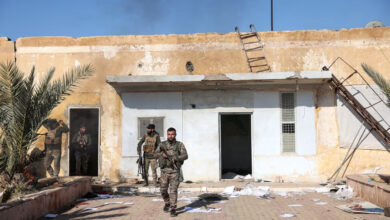Two rockets hit Hezbollah's heartland in Beirut on Sunday as the Lebanese Shiite group battled alongside Syrian regime forces and Damascus said it agreed "in principle" to attend a Geneva peace conference.
The early morning attack came as Syria's fractured opposition held an unscheduled fourth day of meetings on the peace conference proposal and after Hezbollah pledged to fight for "victory" in Syria over the rebels.
Its chief Hassan Nasrallah said it was in the militant anti-Israeli group's own interest to defend President Bashar al-Assad's regime.
"I have always promised you a victory and now I pledge to you a new one" in Syria, he said.
Hours later, two Grad rockets slammed into Al-Shayyah area of southern Beirut, a security source said, wounding four Syrian workers at a car dealership.
It was the first time the Lebanese capital's mainly Shiite southern suburbs have been targeted during the more than two-year-old conflict in Syria.
An AFP photographer said the second rocket damaged an apartment block.
There was no immediate claim of responsibility for the attack which Interior Minister Marwan Charbel denounced as "sabotage".
"We hope that what is happening in Syria will not spill over into Lebanon," he said.
During the past week, 31 people have been killed in clashes in Lebanon's northern port of Tripoli between supporters and opponents of Syria's regime.
The army found two abandoned rocket launchers in Aitat, southeast of Beirut's southern suburbs, the security source said.
"The people will not be intimidated by such acts and are determined to defend the resistance (Hezbollah)… We will prevent all sectarian dissent," Hezbollah MP Ali Ammar said.
With the violence in Syria raging and spreading, Syrian Foreign Minister Walid Muallem said his government would attend "in principle" the Geneva peace conference Washington and Moscow are hoping to hold next month.
"We think… that the international conference represents a good opportunity for a political solution to the crisis in Syria," Muallem said.
French Foreign Minister Laurent Fabius, meanwhile, said Paris would host on Monday a meeting with Russia and the United States to prepare for the conference.
Also on Monday, EU foreign ministers were to meet in Brussels with the bloc deeply divided over whether to arm rebels in Syria, ahead of the expiry at midnight Friday of sanctions against the country, including an arms embargo.
Fabius condemned the Beirut rocket attacks, saying it was crucial to "avoid the war in Syria becoming a war in Lebanon".
The foreign minister of Bahrain, which has been battling Shiite-led protests, branded Nasrallah a "terrorist" who must be stopped.
"Stopping him and rescuing Lebanon from his grip is a national and religious duty for all of us," Sheikh Khaled Al-Khalifa said.
Jordan, which shares borders with Syria and hosts more than 500,000 Syrian refugees, said it is in talks "with friendly countries" to deploy Patriot missiles on its territory after a similar move by Turkey.
In Istanbul, the opposition Syrian National Coalition met for a fourth day to try to overcome deep divisions over the peace conference.
The opposition's long-standing position is that, after more than two years of devastating conflict which has killed more than 94,000 people, it will not negotiate until Assad agrees to leave.
Delegates said efforts to reach an agreed position on the conference were being delayed by pressure from some of the opposition's Gulf Arab backers for an overhaul of its membership.
"You have Saudi Arabia and the United Arab Emirates pushing to include up to 30 new members in the National Coalition," a Coalition member said on condition of anonymity.
"Their goal is to downsize the Muslim Brotherhood's influence over the group," he added.
Syrian Kurds opposed to the regime also want to participate in the so-called Geneva 2 conference, either as National Coalition members or not, key Kurdish representatives in Istanbul said.
The Coalition, meanwhile, urged hundreds of Hezbollah fighters in Syria to defect.
Hezbollah's intervention has given Assad the upper hand in Qusayr, a strategic central town in Syria, which provides an important rebel supply line from Lebanon and serves as a link to Assad's Alawite heartland on the Mediterranean.
Syrian forces launched an assault on Qusayr a week ago but are still being fiercely resisted.
Even as Nasrallah vowed victory in Syria, 22 Hezbollah fighters were killed in the Qusayr battle on Saturday, a source close to the movement said.
The Syrian Observatory for Human Rights said Hezbollah lost 10 fighters in Qusayr, out of a total of 147 people killed in violence across the country on Saturday, including 79 rebels.




